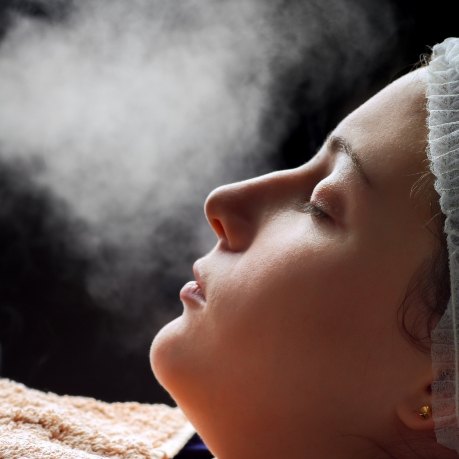Ozonated Water Therapy Cherry Hill
A Natural, Non-Invasive Way to Protect Your Smile
Ozonated water therapy in Cherry Hill is a completely natural way to help curb the impact that common oral health problems, like cavities and gum disease, have on your smile. The process is simple and straight-forward—Dr. Lee will apply the ozonated water to your teeth and gums, helping kill microorganisms and harmful oral bacteria that lead to the development of gum disease, decay, and bad breath. You can learn more about how we use this treatment method below, or feel free to call our office!
What is Ozone Therapy?

Ozonated water is water infused with ozone, or O3, a molecule containing three oxygen atoms. In an ozone molecule, two oxygen atoms form a basic oxygen molecule (O2), while the third acts as a “radical” loosely attached to the basic molecule. This third atom can easily attach to other molecules and break down their structure. In this way, ozonated water can destroy the cell walls of microorganisms, which means the bacteria to blame for gum disease and cavities are no match for this state-of-the-art disinfectant.
Ozonated water is used for sanitation purposes in many industries, including dentistry. Dentists are adopting ozonated water as a healthy and safe disinfectant, whether used before surgery, after tooth extraction, or to combat gum disease.
In one recent study, ozonated water was found to improve health outcomes for patients with moderate gingivitis—so much so that the study suggested it could serve as an alternative to specialized periodontal mouthwash. Other studies have found that ozonated water is effective at killing the bacteria responsible for periodontitis without damaging healthy oral tissue, making it a powerful tool to treat and prevent gum disease. Further studies show that this therapy also works as well as, or even better, than a medicated mouthwash with chlorhexidine.
When is Ozone Therapy Used?

Ozone therapy can be used in a variety of situations, including to:
- Remineralize tooth enamel, which is the outermost protective layer of teeth.
- Eliminate early signs of decay without needing to alter the tooth.
- Reduce tooth sensitivity caused by enamel erosion.
- Treat and heal canker sores and the pain that comes with them.
- Aid in the safe removal of toxic oral materials, like amalgam fillings.
- Treat early signs of gum disease.
I Need a Checkup & Cleaning I Have Diabetes & Need Dental Care I am Worried About Gum Disease I Need a Dentist for My Child I Have a Cavity or Broken Tooth I am Missing One or More Teeth I Want to Enhance My Smile I Want a Straighter Smile I am Scared of the Dentist I Have a Dental Emergency I'm Having Trouble Sleeping I Have Jaw Pain I'm Interested in Laser Dentistry View Our Services








